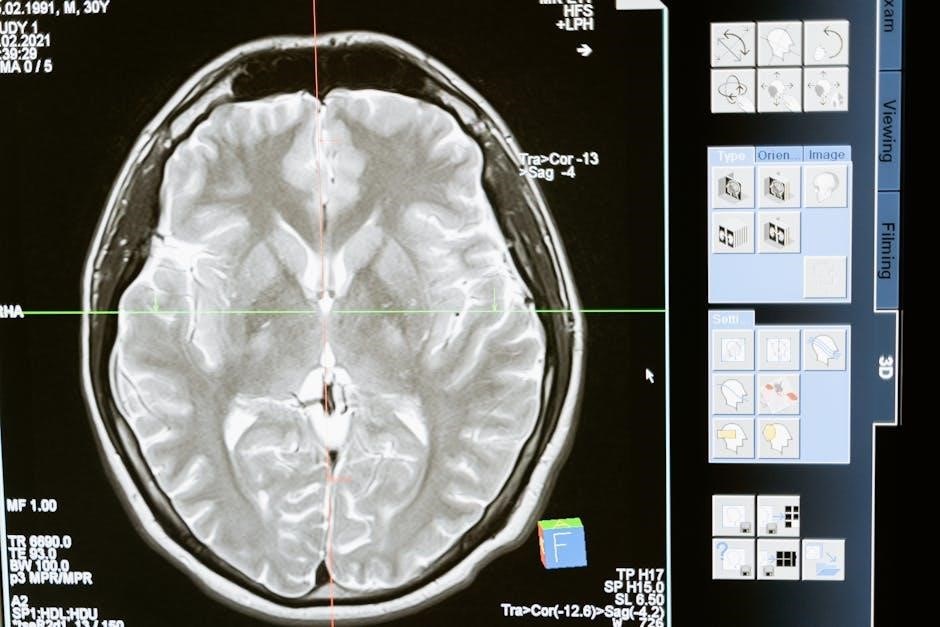Algebra readiness tests assess a student’s arithmetic and pre-algebra skills to determine readiness for Algebra 1. These tests evaluate problem-solving strategies‚ equation-solving‚ and foundational math concepts critical for algebra success.
Overview of Algebra Readiness Tests
Algebra readiness tests are standardized assessments designed to evaluate a student’s readiness for introductory algebra courses. These tests typically cover foundational math skills‚ including arithmetic operations‚ solving simple equations‚ and understanding basic algebraic concepts. They often include multiple-choice questions and problem-solving exercises to gauge a student’s ability to apply math principles to real-world scenarios. Many readiness tests also incorporate geometry and measurement skills‚ such as calculating lengths and areas‚ to ensure a comprehensive understanding of pre-algebra topics. The tests are usually timed and consist of a set number of questions‚ allowing educators to assess a student’s speed and accuracy in problem-solving. By identifying strengths and weaknesses‚ these tests help determine whether a student is prepared to succeed in algebra or if additional review is needed. They are widely used in schools and educational institutions to guide placement decisions and tailor instruction to individual student needs.
Importance of Assessing Algebra Readiness

Assessing algebra readiness is crucial for ensuring students are adequately prepared to succeed in algebra courses. Algebra serves as a foundation for higher-level mathematics‚ and gaps in readiness can lead to challenges in future studies. Readiness tests help educators identify students’ strengths and areas needing improvement‚ enabling targeted instruction and support. By evaluating arithmetic‚ pre-algebra‚ and problem-solving skills‚ these assessments provide insights into a student’s ability to handle algebraic concepts. Early identification of weaknesses allows for intervention‚ reducing the likelihood of struggles in algebra and beyond. Additionally‚ readiness assessments guide placement decisions‚ ensuring students are enrolled in courses that align with their skill levels. This personalized approach fosters academic confidence and sets students up for long-term success in mathematics. Accurate assessment is essential for creating a strong foundation‚ making it a critical step in a student’s math education journey.

Key Components of Algebra Readiness Tests
Algebra readiness tests evaluate arithmetic and pre-algebra skills‚ problem-solving strategies‚ and foundational math concepts. They assess equation-solving‚ geometry‚ and algebraic expressions to ensure readiness for advanced math courses.

Arithmetic and Pre-Algebra Skills Assessment
The arithmetic and pre-algebra skills assessment is a critical component of algebra readiness tests. It evaluates a student’s ability to handle fundamental operations such as addition‚ subtraction‚ multiplication‚ and division with integers‚ fractions‚ and decimals. This section also covers basic algebraic concepts‚ including solving simple equations‚ understanding variables‚ and working with exponents. Students are tested on their ability to translate verbal expressions into algebraic forms and solve them effectively. Additionally‚ the assessment includes problems involving geometry‚ such as finding lengths‚ areas‚ and volumes‚ which are essential for advancing into algebra; The skills assessed here form the backbone of algebraic thinking and ensure that students are prepared to tackle more complex problems in the future. Without a strong foundation in these areas‚ students may struggle with the abstract concepts introduced in algebra courses.
Problem-Solving Strategies and Techniques
Algebra readiness tests emphasize the development of problem-solving strategies and techniques to tackle mathematical challenges effectively. These tests include a variety of problems designed to assess a student’s ability to think critically and apply mathematical concepts to real-world scenarios. Key areas include solving equations‚ interpreting word problems‚ and applying geometric principles. Students are also evaluated on their ability to translate verbal expressions into algebraic forms and solve them systematically. Additionally‚ the tests often incorporate multi-step problems that require the use of arithmetic and pre-algebra skills in combination. By focusing on these problem-solving techniques‚ the tests help identify gaps in a student’s understanding and ensure they are well-prepared to approach more complex algebraic concepts. Mastery of these strategies is essential for success in algebra and higher-level mathematics.

Preparing for Algebra Readiness Tests
Effective preparation for algebra readiness tests involves practicing foundational arithmetic‚ pre-algebra skills‚ and problem-solving techniques. Utilize study guides‚ sample tests‚ and online resources to build confidence and fluency in math concepts.

Practice Materials and Resources
Effective preparation for algebra readiness tests requires access to high-quality practice materials and resources. These include algebra readiness test PDFs‚ which offer sample questions‚ diagnostic assessments‚ and comprehensive answer keys. Many educational websites provide free downloadable worksheets and guides that cover essential topics like solving equations‚ simplifying expressions‚ and understanding functions. Additionally‚ textbooks such as the Algebra II Workbook For Dummies include practice problems and explanations to help students build their skills. Online platforms also offer interactive tools and timed tests to simulate actual test conditions‚ enabling students to improve their time management and problem-solving strategies. Utilizing these resources ensures that students can identify their strengths and weaknesses‚ allowing them to focus their study efforts effectively. Regular practice with these materials is crucial for achieving readiness and confidence in algebra.
Understanding Test Formats and Time Management
Understanding the format of algebra readiness tests is crucial for effective preparation. Most tests consist of multiple-choice questions‚ with some including open-response or problem-solving sections. For example‚ a common format includes 50 multiple-choice problems to be completed in 45 minutes‚ covering topics like integers‚ fractions‚ and simple equations. Time management is essential‚ as students must balance thorough problem-solving with efficient pacing. Practicing with sample tests‚ such as those found in algebra readiness test PDFs‚ helps students familiarize themselves with the structure and timing. Many resources‚ like the Algebra 1 Readiness Assessment‚ provide detailed instructions and examples to guide students. By understanding the test format and practicing time management strategies‚ students can reduce anxiety and perform at their best. This preparation ensures they can demonstrate their true readiness for algebra studies.

After completing an algebra readiness test‚ students should review their results to identify strengths and areas needing improvement. Using resources like algebra readiness test PDFs‚ they can create tailored study plans. Teachers and tutors can offer personalized feedback to address gaps in understanding. By focusing on identified weaknesses and maintaining consistent practice‚ students can build a strong foundation for success in algebra and beyond.
Interpreting Test Results and Determining Readiness
Interpreting algebra readiness test results involves analyzing scores to assess a student’s mastery of arithmetic and pre-algebra skills. Many algebra readiness test PDFs include answer keys and scoring guidelines to help determine readiness. Scores indicate strengths in areas like solving equations‚ working with integers‚ and applying problem-solving strategies. If a student achieves a high score‚ they may be ready for Algebra 1. Lower scores highlight areas needing improvement‚ such as fractions or exponents. Teachers often use these results to create personalized learning plans‚ ensuring students are adequately prepared before advancing. Parents and educators can also use these tests to track progress and provide targeted support‚ helping students feel confident in their math abilities. Regular practice with additional algebra readiness test PDFs can reinforce learning and improve readiness over time.
Guidance for Moving Forward in Algebra Studies
After taking an algebra readiness test‚ students should use the results to guide their next steps. If they demonstrate strong foundational skills‚ they may proceed confidently to Algebra 1. For those needing improvement‚ focused practice on specific areas‚ such as fractions or equation-solving‚ is essential. Utilizing algebra readiness test PDFs and practice materials can reinforce learning and build confidence. Students should also review problem-solving strategies and techniques to enhance their critical thinking skills. Regular practice with sample tests can help improve time management and familiarity with test formats. Additionally‚ seeking support from teachers or tutors can address specific challenges. By addressing skill gaps and maintaining consistent practice‚ students can ensure a smooth transition into algebra studies. Progress monitoring through periodic assessments will help track improvement and readiness for more advanced math courses.

